On 22nd October 2019, the Worldwide Head of the Ahmadiyya Muslim Community, the Fifth Khalifah (Caliph), His Holiness, Hazrat Mirza Masroor Ahmad(aba) delivered a landmark and historic address in the heart of Berlin, entitled ‘Islam and Europe: A Clash of Civilisations?’ Three decades after that famous symbol of division, the Berlin Wall was knocked down, His Holiness urged today’s leaders and governments to demolish the walls of hatred and conflict that have plagued modern day society. Speaking to an audience comprising more than 80 dignitaries and influential guests, including Members of the Bundestag (Parliament), diplomats, academics, faith leaders and representatives of the media, whilst standing just a few hundred metres from the Brandenburg Gate at the Adlon Kempinski Hotel, His Holiness directly addressed the common allegation that the presence of Islam and Muslims is a threat to Western civilisation and culture. Prior to the keynote address, several distinguished speakers took to the stage and spoke of their admiration of the Ahmadiyya Muslim Community and its efforts to propagate Islam’s message of peace across the world, as well as its commitment to serving humanity. These included Abdullah Wagishauser, National President of the Ahmadiyya Muslim Community in Germany who welcomed the guests, Frank Heinrich (CDU Party), Member of Parliament, Omid Nouripour (Green Party), Member of Parliament and Niels Annen (SPD Party), Minister of State at the Federal Foreign Office and Member of Parliament.
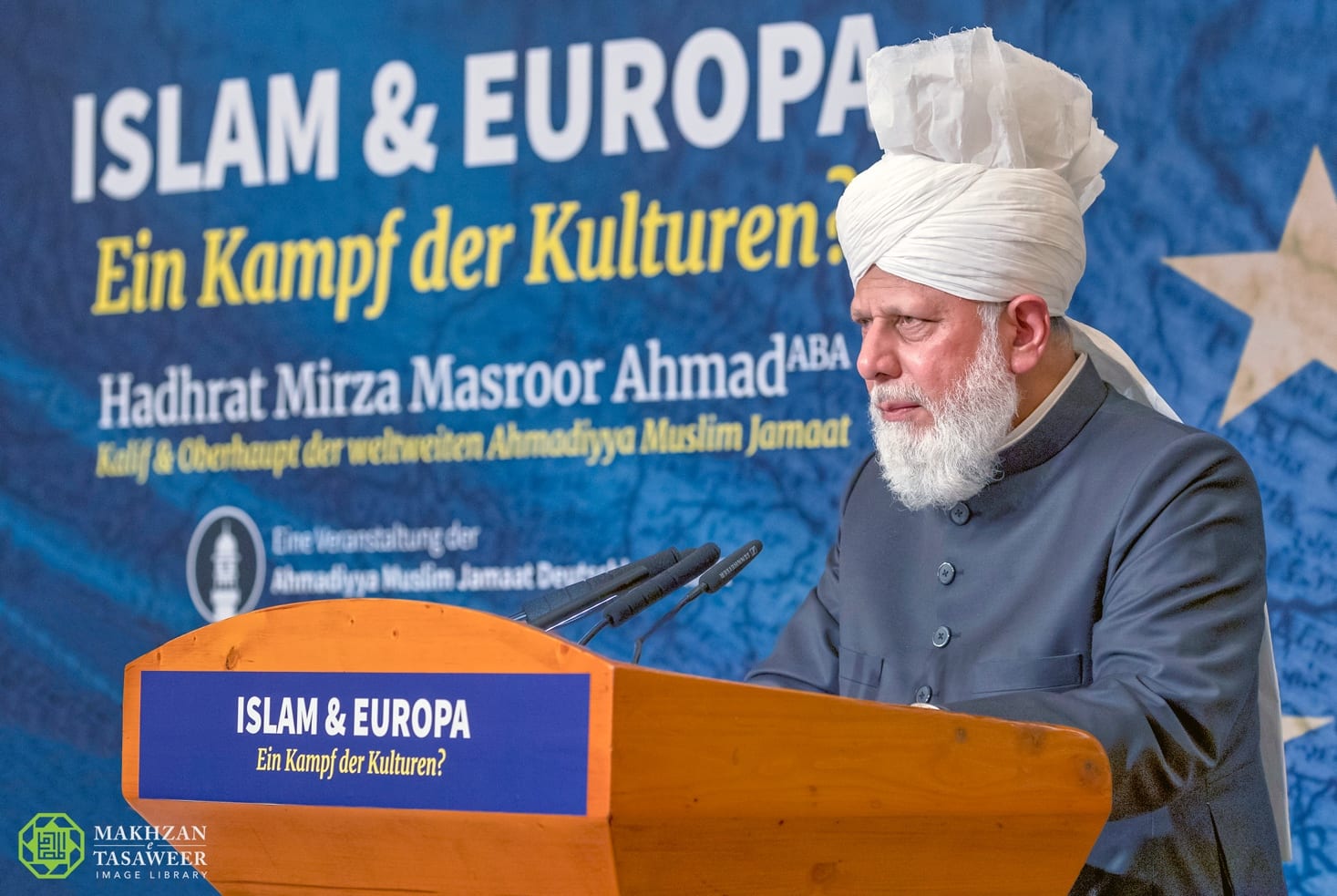
Hazrat Mirza Masroor Ahmad, Worldwide Head of the Ahmadiyya Muslim Community, Fifth Khalifah (Caliph) said:
“Bismillahir Rahmanir Raheem – in the Name of Allah, the Gracious, the ever Merciful.
All distinguished guests, Assalamo Alaikum Wa Rahmatullahe Wa Barakatohu – peace and blessings of Allah be upon you all.
First of all, I would like to take this opportunity to thank all of our guests who have accepted our invitation and joined us here this evening. In the world today, particularly in Western and developed nations, there is a great deal of heated debate about immigration and its effect on societies. Much of the debate centres around Muslims. Certain governments and members of the public fear a clash of civilisations and believe that Muslims are a threat to their society and cannot integrate into the Western world.
Before responding to this contention, it is important to define what exactly is meant by ‘civilisation’? In this regard, I present the definition given by the Second Head of the Ahmadiyya Muslim Community, which I fully concur with.
According to the definition, civilisation is the material progress and development of a society. Factors that indicate the strength of a civilisation include its economic progress, the level of technological innovation, the advancement of the means of travel, communication and the intellectual progress of the society. Furthermore, the efforts of a nation to foster peace and stability, whether by virtue of its law enforcement and military proficiency or by other means is also a measure of its civilisation.
Separate and distinct from civilisation is a nation’s culture. Culture is a manifestation of the views of a people, their attitudes towards social issues and their practices and instead of being based on material progress, culture is rooted in morality and the religious values and traditions of a nation.
Thus, civilisation is the material, technological and intellectual development of a society, whereas its culture is based on the religious, moral and philosophical make-up of that society.
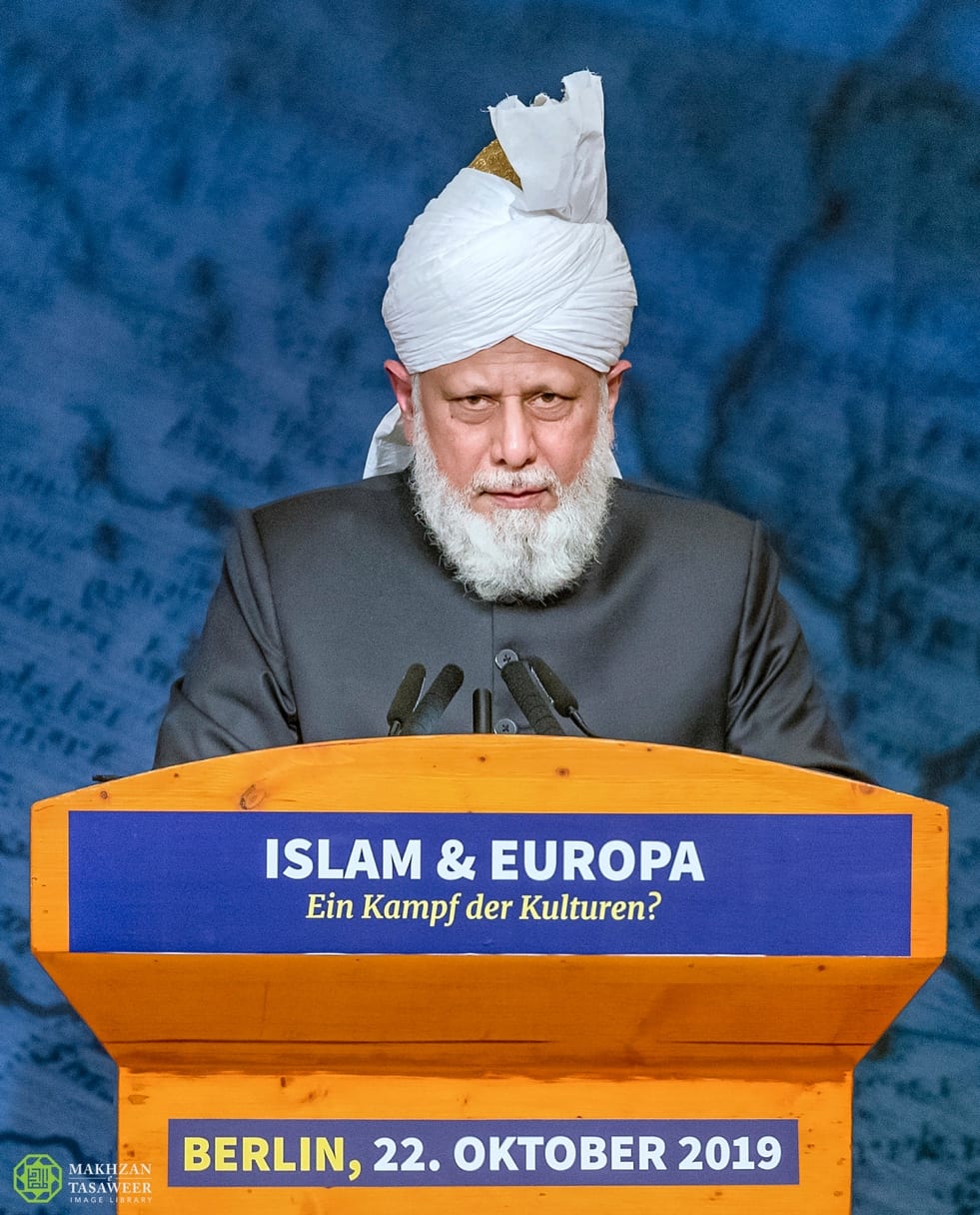
The difference between civilisation and culture can be easily understood if we look back to the early period of Christianity. At that time, the Roman Empire was at the peak of its powers and, even now, it is considered as one of the greatest civilisations in the history of the world. Due to their material prosperity, urbanisation and the way its territories were governed, the Romans were considered to be tremendously civilised and educated.
However, their sophistication did not equate to higher standards of morality; rather, it was during the early period of Christianity that their people were infused with a progressive culture. Christianity gave people guiding principles based on religion and morality, whilst the Romans prescribed worldly laws and limits.
Hence, the progress and advancement of the Romans reflected their great civilisation, whereas Christianity gave the people a laudable culture. Over time, Christianity became the predominant religion of the Roman Empire and so the culture it established was adopted by a great civilisation. Allied together their supreme influence laid the foundations for the values and traditions that remain today in the West, despite the fact that people in the West are now moving away from religion.
Regarding the debate about immigration, in recent decades, the demographics of several Western countries has altered. Immigrants have arrived from many countries, but it has been the influx of Muslims that has caused most concern and alarm. Many indigenous people fear that mass immigration from Muslim countries threatens their civilisation, culture and values, which have existed for many centuries.
As I have explained, we consider civilisation to be the material progress and advancement of society and rather than disapprove, oppose or deny the growth and development in the West, developing nations seek to emulate it. As a result, rather than Western civilisation being cast aside, we are seeing the opposite.
Due to the modern means of travel and communication, the world has become a global village. The advent of television, mass media and particularly the internet have meant that nothing now remains hidden in the world and so people who live in economically deprived countries can see how those in affluent nations live. They are being influenced by Western civilisation and desire to attain similar levels of material advancement and innovation.
Thus, the assertion that Western or European civilisation is threatened by the presence of Muslims does not hold water; rather, Western civilisation is influencing other parts of the world and this includes the Muslim world. On the other hand, a fear that the religious and moral culture of the West could be threatened if Islam spreads in Europe is a more legitimate concern and I shall now address this point.
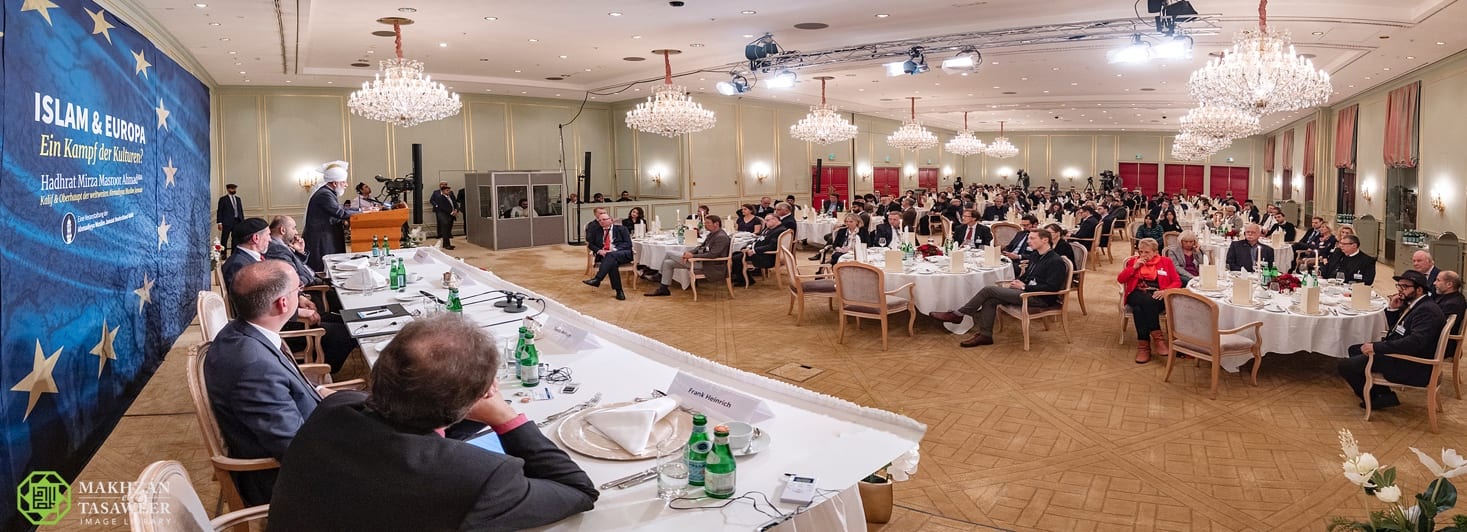
Firstly, it is undeniable that people are rapidly moving away from religion and this trend is particularly acute in the West. In Western countries, whenever a census is conducted it shows that people are less and less inclined towards religion or belief in God. Given this, I believe that the rapid increase of atheism is a far greater threat to Western culture than Islam. Western values are centuries old and are based upon its religious traditions and especially on its Christian and Jewish heritage. However, these religious values and cultural norms are under attack from those who oppose all forms of religion and faith.
So, as a Muslim leader, I believe you should protect your heritage and culture by focusing your energies on arresting the decline in religion and bringing people back towards faith and belief, whether that be Christianity, Judaism or any other. It should not be that in the name of advancement, those values and moral standards that have been part of society for many centuries are suddenly abandoned.
I also believe that the decline in religion in the West is the main reason people fear Islam, because they know that, broadly speaking, Muslims remain attached to their faith. In light of this, I wish to make it clear that, despite what you hear or read in the media, there is no cause to fear Islam. Muslims believe the Holy Quran to be a final and perfect religious teaching and it is due to our love and obedience to the Holy Quran that we firmly believe that religion is a matter of the heart and personal to every individual.
In chapter 2, verse 257, the Holy Quran has categorically stated that there should be no compulsion in matters of religion. Therefore, there is no need for non-Muslims to fear that Muslims will try to forcefully spread their beliefs or impose their views on this part of the world. The hateful ideology of the tiny minority of so-called Muslims who have adopted extremism bears no correlation with the teachings of the Holy Quran. Indeed, I have said many times that governments and the relevant authorities should deal very firmly with extremists, be they Muslims or non-Muslims.
In terms of the Ahmadiyya Muslim Community, we believe that under no circumstances does Islam permit the use of force or any type of coercion in the spread of faith. Why then is there a need to fear Islam? Why do people think that their civilisation or culture is at risk from Muslims?
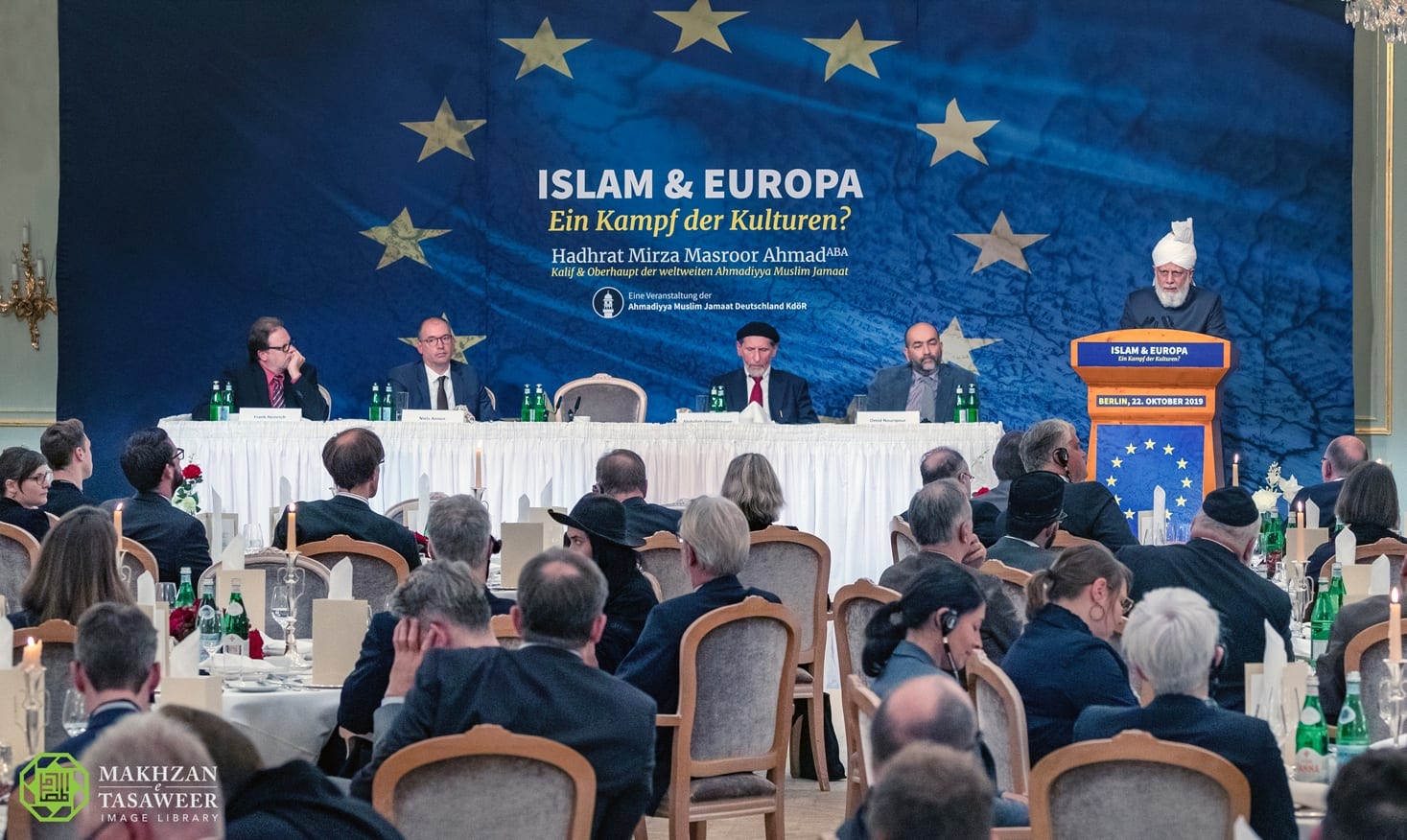
Now, after explaining the differences between civilisation and culture from an Islamic perspective, I would like to present some of the core teachings of Islam. Many myths and misconceptions about Islam and its Founder (peace and blessings of Allah be upon him) have spread and whilst it is not possible to cover all aspects of Islamic teachings in the short time available, I would like to mention some of the rights of mankind that Islam has established.
A very significant verse of the Holy Quran, in terms of human rights, is chapter 4, verse 37 which states:
“And worship Allah and associate naught with Him, and show kindness to parents, and to kindred, and orphans, and the needy, and to the neighbour who is a kinsman and the neighbour who is a stranger, and the companion by your side, and the wayfarer and those whom your right hands possess…”
In this verse, where Allah the Almighty instructs Muslims to worship Him, He also instructs them to treat their parents with love and affection. How can this teaching, requiring Muslims to love and honour their parents clash with any religion or nation? The verse also requires Muslims to treat their relatives and loved ones with kindness and consideration. It requires them to support and comfort the most vulnerable and under-privileged members of society, such as orphans.
In this regard, we believe that one of the key ways to help the poor is through education. If younger members of society, who are from broken homes or who are stricken by poverty are educated, it will enable them to break free from the shackles of destitution. Opportunities will open up to them and so, free from frustration and resentment, such youths will grow to be productive members of society, rather than being lured towards a life of crime or gang culture. This is why, the Ahmadiyya Muslim Community lays great emphasis on education and within our limited resources, we have built schools in various African countries and fund scholarships for students who cannot afford higher education.
We also believe that rich countries should help the weaker nations of the world build solid foundations. If poorer countries can build up their economies and infrastructures, their people will have opportunities at home and have far less reason to migrate abroad. If their nations are stable and prosperous, it naturally follows that the region and the wider world will benefit.
In the aforementioned verse of the Holy Quran, special mention is made to fulfilling the rights of one’s neighbours, whether they are Muslim or non-Muslims and it defines the scope of neighbours to be extremely wide. Furthermore, the Prophet of Islam (peace and blessings of Allah be upon him) said that God Almighty had emphasised the rights of neighbours so strongly that he came to think neighbours would be included amongst a person’s rightful heirs.
The Founder of Islam (peace and blessings of Allah be upon him) also taught that a person who is not grateful to his fellow human beings, cannot be grateful to Allah the Almighty. What a beautiful principle! Thus, it is necessary that alongside the worship of God, a Muslim must fulfil the rights of humanity.
Again, I would ask how can such a teaching be a threat to Western civilisation? Hence, in my view, it is counter-productive for Western people to suggest that Islam or Muslims have no place in this part of the world.
If Muslims come here seeking to integrate, to fulfil the rights of neighbours and strive for the peace and betterment of society, then surely this is something to praise, rather than to condemn or castigate.
Moving on, some people argue or believe that Muslims are instructed to perform Jihad and so they fear they will come to the West and wage a violent war seeking to enforce an Islamic civilisation and culture and shatter the peace of society. This is based on a clear misunderstanding of what Jihad is and why religious wars were fought in the early period of Islam. Islam is not a bloodthirsty or violent religion.
Once a companion of the Holy Prophet Muhammad (peace and blessings of Allah be upon him) asked to join the Muslim army so he could take part in Jihad. The Prophet of Islam (peace and blessings of Allah be upon him) rejected his plea and said that, because his parents were in a fragile state, he should remain at home, care for them and consider that to be his Jihad. If the objective of Jihad was conquest, bloodshed and warfare, the Prophet of Islam (peace and blessings of Allah be upon him) would surely have taken up his offer and sought to bolster the Muslim army.
I should clarify that whilst it is true that Muslim armies fought in some religious wars during the early period of Islam, the purpose was never to overpower, oppress or compel people to accept Islam. Those wars were fought to protect the institution of religion and uphold principle of freedom of belief.
In chapter 22, verses 40-41, the Holy Quran very clearly states that if the aggressors were not stopped, all churches, synagogues, temples, mosques and other places of worship would be under grave threat, as the underlying intention of the disbelievers of Makkah was to destroy all traces of religion from the face of the earth. This proves that Islam protects all religions.
Then, with regard to bringing up our children, chapter 6 verse 152 of the Holy Quran states that Muslims must not ‘slay their children’. This commandment instructs Muslims to nourish their children with love and affection, to morally guide them and to educate them so that they grow to become highly competent and moral individuals who are assets to their community and nation.
Similarly, Islam has taught Muslims to defend the rights of vulnerable members of society. For example, in chapter 4, verse 7 of the Quran, Muslims are obliged to protect orphan children from exploitation and to guard their inheritance with integrity, until they reach an age where they can manage it themselves.
Furthermore, another very common allegation in the Western world is that Muslims do not respect women or their rights. First of all, it should be noted that Islam was the first religion to give women the right to inherit, the right to divorce and various other rights. In addition, Islam emphasises the vast importance of educating girls and giving them opportunities for personal growth and development.
Moreover, in a famous saying, the Holy Prophet of Islam (peace and blessings of Allah be upon him) said that “paradise lies under the feet of one’s mother.” These words illustrate the momentous role women play in society and their unique and distinguished status in society. Mothers are the people who have the power and influence to turn their nations into a heaven on earth and who can unlock the doors to an eternal paradise for their children.
Furthermore, in chapter 4, verse 20, the Holy Quran has stated that Muslim men must treat their wives lovingly and respectfully. In Western countries, not a day goes by without reports of the police or the courts being forced to intervene and deal with horrifying cases of domestic abuse. Various studies and reports, such as the 2018 report by the Office for National Statistics in the UK, prove that such crimes are not linked to any religion and another recent report has shown that the same is true here in Germany. Thus, it is entirely unjust to brand Islam as a misogynistic religion.
Islam also requires its followers to respect the religious sentiments and beliefs of other people. The Covenant of Madinah was a true illustration of this teaching where the Torah was recognised and respected as the law-bearing book of the Jews.
Islam has even established the rights of a person’s enemies and opponents, whereby chapter 2, verse 191 of the Holy Quran states that no injustice or transgression should be done against one’s enemy, even during a state of war. Regrettably, in today’s world, which proudly boasts of being more civilised and advanced than any previous era, individuals and countries disregard the rights of their opponents as a matter of routine and perpetrate huge cruelties and waste no opportunity for revenge.
In chapter 5, verse 9 of the Holy Quran, Allah the Almighty has proclaimed that the enmity of a nation or people should never incite a person to sacrifice the principles of justice and equity; rather, Islam teaches that in all circumstances, no matter how challenging, you must remain firmly attached to the principles of justice and integrity and never be motivated by a desire for vengeance.
As a result of this magnificent teaching, we see the unparalleled example of grace, compassion and mercy exhibited by the Holy Prophet Muhammad (peace and blessings of Allah be upon him) at the time of the Victory of Makkah. History proves that Muslims were killed, plundered and tortured in Makkah and ultimately, they were driven out of their homes and had to migrate.
Yet when he returned victoriously to Makkah and the entire city was under his command, his first pronouncement was that no revenge would be taken from those who had brutally persecuted the Muslims. He declared that, in accordance with Islam’s teachings, all those who had tormented the Muslims were to be instantly forgiven and that nobody would be treated unjustly, regardless of whether they accepted Islam or not.
Another moral revolution in favour of the weakest members of society brought by Islam regarded slavery, which prior to Islam, was rampant and considered a normal part of society. In chapter 24, verse 34 the Holy Qur’an states that if a slave seeks freedom, he should be released and if certain fiscal dues are levied, they must be reasonable and payable in small, easily manageable installments or be waived altogether.
In today’s world, physical slavery no longer exists, but it has been replaced by economic bondage and servitude, wherein the relationship between the most powerful nations on earth and weaker countries has become akin to the relationship of a master and a slave. For example, loans disguised as aid-packages are given by rich countries to weaker nations who have no option but to accept whatever strings are attached.
Invariably, the crippling levels of interest mean that the short-term loans lead to long-term misery and liability. The end result is that the defaulting country has no choice but to bend to the will of the dominant nation. Such slavery is utterly immoral.
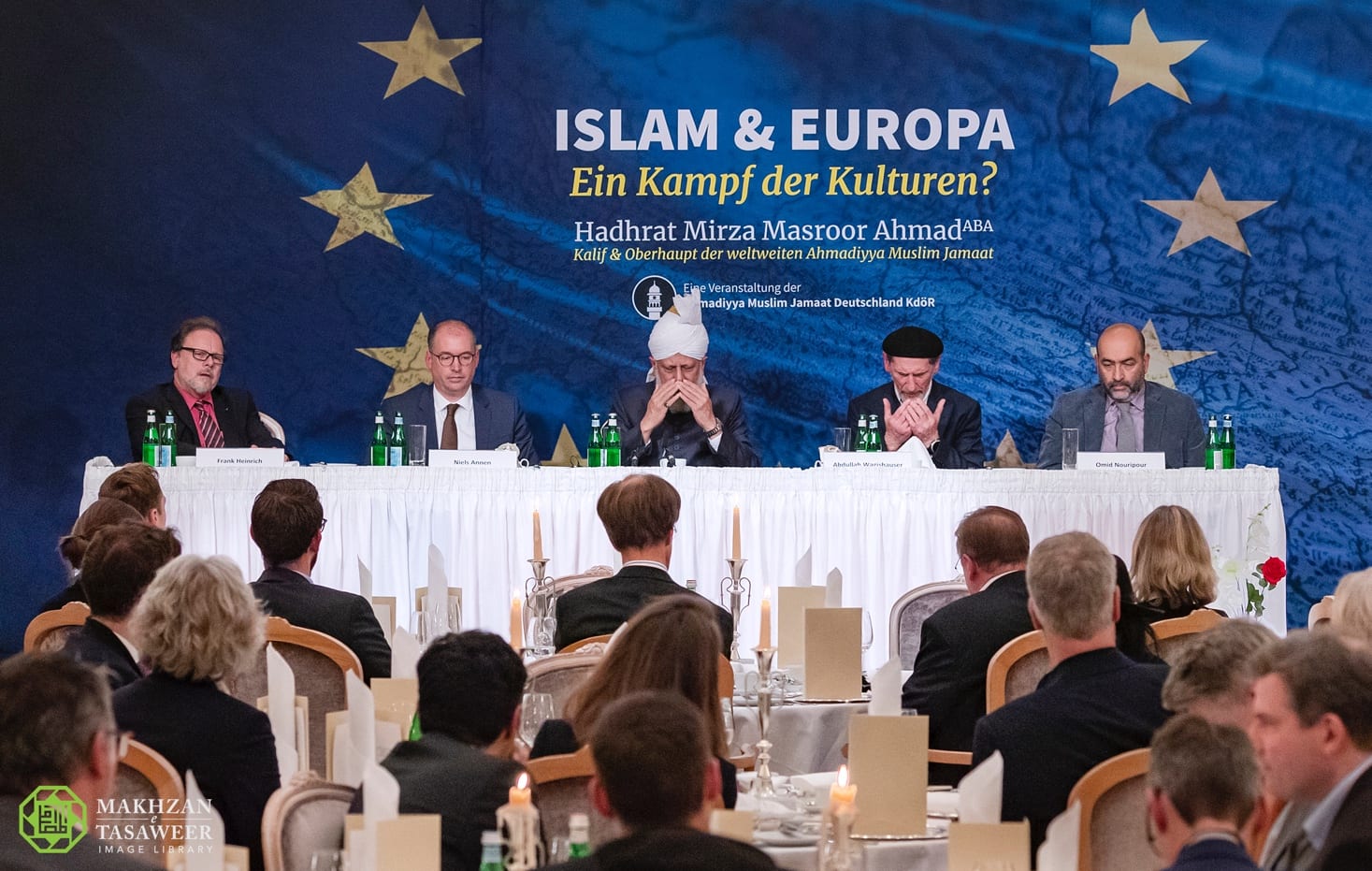
From the outset, Islam also established the rights of non-Muslims and counselled Muslims to show restraint for the sake of the peace and unity of society. For example, in chapter 6, verse 109, the Holy Quran declares that Muslims should not even speak against the idols of non-religious people, because it could provoke them to speak against Allah the Almighty.
In the short time available, I have mentioned only a few points that illustrate the rights of humanity that have been established by Islam. I hope what I have said will have reassured you that Islam is not a threat to Western civilisation or its culture. If there are any Muslims who usurp the rights of non-Muslims it is only because they reject Islam’s teachings or are wholly ignorant of them.
In conclusion, it is clear we are living in a world that is on tenterhooks and I fear the precarious situation we are facing could escalate at any time.
People must realise that words can have far-reaching consequences and so rather than speaking of a clash of civilisations, or needlessly ratcheting up tensions between different communities, people should refrain from attacking the religious teachings of one another. Instead of seeking to place restrictions upon the expressions of faith, we should recognise that we are all part of one human race more connected than ever before. We should embrace our diversity and focus on establishing unity so that long-term peace can develop in the world.
However, currently we are seeing the opposite. Muslim and non-Muslim countries alike are putting their own interests ahead of the interests of the wider world and are crossing all limits of fairness and morality in pursuit of their goals. Reminiscent of the dark days of the past, opposing blocs and alliances are forming and it seems as though the world is hell-bent on inviting its destruction.
Today, there are a host of countries who have acquired nuclear bombs or other destructive weapons that have the potential to destroy civilisation as we know it. Who is to say that these weapons will never be used or will not end up in the wrong hands? If nuclear weapons are ever used, it will not just be us who bear the consequences; rather, our children and future generations will have to suffer for our sins. Generations of children will be born with intellectual and physical disabilities and have their hopes and dreams shattered through no fault of their own.
Is that the parting legacy we wish to bequeath to those who follow us?
Surely not!
Thus, instead of fanning flames of hatred, whether based on religious or ethnic differences or for political objectives, we must recognise the warning signs and change our ways before it is too late.
Let us all, irrespective of our differences, join together and work with a spirit of mutual respect, tolerance and affection for the peace of the world and to promote freedom of belief.
With these words, I would like to thank you once again for joining us this evening.
Thank you very much.”